第208章 XXIX.(14)
"And this faire couple eke to shroud themselves were fain" (that is, from the rain). So the noun = shelter, protection; as in Shakespeare, A. and C. iii. 13. 71: "put yourself under his shroud," etc. See also on 757 below.
260. Maronnan's cell. "The parish of Kilmaronock, at the eastern extremity of Loch Lomond, derives its name from a cell, or chapel, dedicated to Saint Maronock, or Marnock, or Maronnan, about whose sanctity very little is now remembered" (Scott).
Kill = cell; as in Colmekill (Macb. ii. 4. 33), "the cell of Columba," now known as Icolmkill, or Iona.
270. Bracklinn's thundering wave. This beautiful cascade is on the Keltie, a mile from Callander. The height of the fall is about fifty feet. "A few years ago a marriage party of Lowland peasants met with a tragic end here, two of them having tumbled into the broken, angry waters, where they had no more chance of life than if they had dropped into the crater of Hecla" (Black).
271. Save. Unless; here followed by the subjunctive.
274. Claymore. The word means "a large sword" (Gaelic claidheamh, sword, and more, great).
294. Shadowy plaid and sable plume. Appropriate to Roderick Dhu. See on 220 above.
303. Woe the while. Woe be to the time, alas the time! Cf.
Shakespeare, J. C. i. 3. 82: "But, woe the while! our fathers' minds are dead," etc. See also on i. 166 above.
306. Tine-man. "Archibald, the third Earl of Douglas, was so unfortunate in all his enterprises, that he acquired the epithet of 'tine-man,' because he tined, or lost, his followers in every battle which he fought. He was vanquished, as every reader must remember, in the bloody battle of Homildon-hill, near Wooler, where he himself lost an eye, and was made prisoner by Hotspur.
He was no less unfortunate when allied with Percy, being wounded and taken at the battle of Shrewsbury. He was so unsuccessful in an attempt to beseige Roxburgh Castle, that it was called the 'Foul Raid,' or disgraceful expedition. His ill fortune left him indeed at the battle of Beauge, in France; but it was only to return with double emphasis at the subsequent action of Vernoil, the last and most unlucky of his encounters, in which he fell, with the flower of the Scottish chivalry, then serving as auxiliaries in France, and about two thousand common soldiers, A.D. 1424" (Scott).
307. What time, etc. That is, at the time when Douglas allied himself with Percy in the rebellion against Henry IV. of England.
See Shakespeare, 1 Hen. IV.
309. Did, self unscabbarded, etc. Scott says here: "The ancient warriors, whose hope and confidence rested chiefly in their blades, were accustomed to deduce omens from them, especially from such as were supposed to have been fabricated by enchanted skill, of which we have various instances in the romances and legends of the time. The wonderful sword Skofnung, wielded by the celebrated Hrolf Kraka, was of this description. It was deposited in the tomb of the monarch at his death, and taken from thence by Skeggo, a celebrated pirate, who bestowed it upon his son-in-law, Kormak, with the following curious directions: '"The manner of using it will appear strange to you. A small bag is attached to it, which take heed not to violate. Let not the rays of the sun touch the upper part of the handle, nor unsheathe it, unless thou art ready for battle. But when thou comest to the place of fight, go aside from the rest, grasp and extend the sword, and breathe upon it. Then a small worm will creep out of the handle; lower the handle, that he may more easily return into it." Kormak, after having received the sword, returned home to his mother. He showed the sword, and attempted to draw it, as unnecessarily as ineffectually, for he could not pluck it out of the sheath. His mother, Dalla, exclaimed, "Do not despise the counsel given to thee, my son." Kormak, however, repeating his efforts, pressed down the handle with his feet, and tore off the bag, when Skofung emitted a hollow groan; but still he could not unsheathe the sword. Kormak then went out with Bessus, whom he had challenged to fight with him, and drew apart at the place of combat. He sat down upon the ground, and ungirding the sword, which he bore above his vestments, did not remember to shield the hilt from the rays of the sun. In vain he endeavored to draw it, till he placed his foot against the hilt; then the worm issued from it. But Kormak did not rightly handle the weapon, in consequence whereof good fortune deserted it. As he unsheathed Skofnung, it emitted a hollow murmur' (Bartholini de Causis Contemptae a Danis adhuc Gentilibus Mortis, Libri Tres. Hafniae, 1689, 4to, p. 574).
"To the history of this sentient and prescient weapon, I beg leave to add, from memory, the following legend, for which Icannot produce any better authority. A young nobleman, of high hopes and fortune, chanced to lose his way in the town which he inhabited, the capital, if I mistake not, of a German province.
He had accidentally involved himself among the narrow and winding streets of a suburb, inhabited by the lowest order of the people, and an approaching thunder-shower determined him to ask a short refuge in the most decent habitation that was near him. He knocked at the door, which was opened by a tall man, of a grisly and ferocious aspect, and sordid dress. The stranger was readily ushered to a chamber, where swords, scourges, and machines, which seemed to be implements of torture, were suspended on the wall.